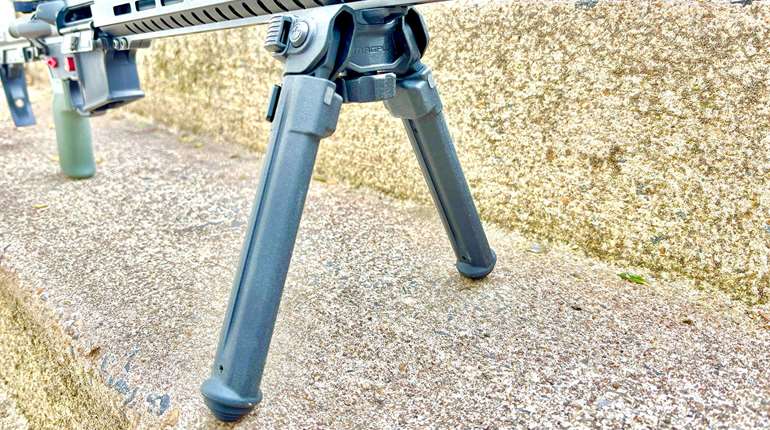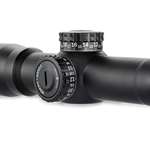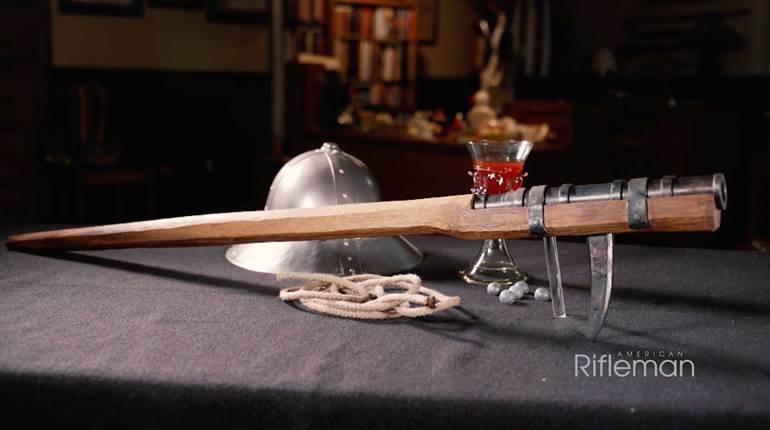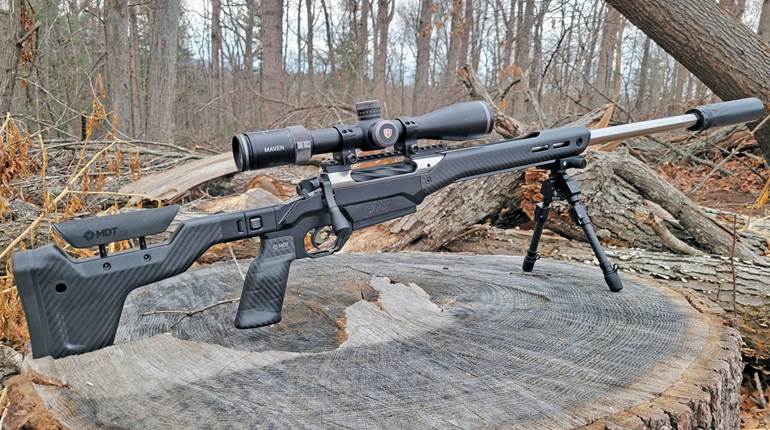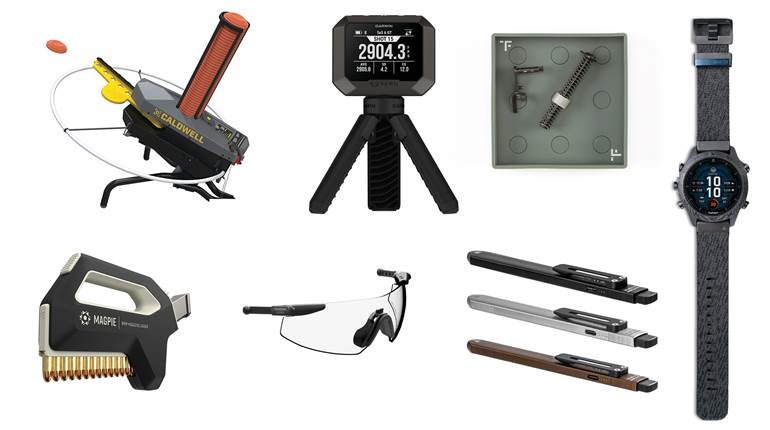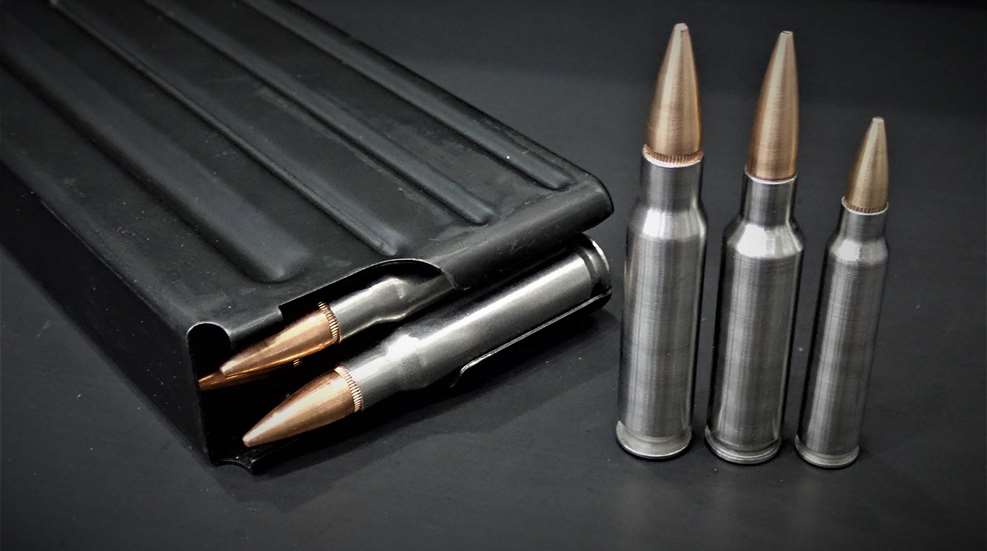
A surprising variety of metal injection molded (MIM) parts are used in today’s guns and OEM offerings. The manufacturing process is light years ahead of what it once was, and the final products are stronger, more resilient and can be manufactured at tighter tolerances than ever before.
It’s also invading a high-pressure application—cartridge cases. American Rifleman mentioned development was underway in an April article about innovative case designs, but we finally caught up with Shawn Rhodes, the principle mechanical engineer at Concurrent Technologies Corporation, the company blazing a MIM trail.
“Our journey with MIM cartridge case technology began in 2014 when the Army contracted us to evaluate lightweight cartridge case concepts,” Rhodes explained in an email. “After assessing numerous technologies against criteria like performance, weight reduction, manufacturability and supply-chain reliability, we found that none of the existing solutions fully met the requirements.”
“This led us to conduct a comprehensive trade study to identify ideal alternatives to traditional brass. Through extensive modeling and simulation, we evaluated materials based on density, stiffness, strength, corrosion resistance and availability. High-strength stainless steel emerged as the optimal candidate.
“The challenge then became finding the right manufacturing process. Traditional methods like deep drawing weren’t suitable for high-strength stainless steel due to its limited ductility. Our analysis revealed that powder metal processes could form net-shape components from these alloys, but conventional press-and-sinter operations were too slow and costly for large-scale production.
“This is what led us to metal injection molding (MIM)—a process already widely used in industries requiring small, precise metal components at scale. We began with CAD design and simulation to concurrently develop both the end product and manufacturing process, creating lightweight and high-performance variants by precisely engineering the case geometry and developing specialized strategies for molding, debinding, sintering and final processing.”
Skeptics
Initially, the design wasn’t greeted with enthusiasm by most in the industry, however. Critics were concerned a case’s thin walls and long length precluded MIM manufacturing as a suitable solution.
“Rather than accepting these limitations, we used modeling and simulation to demonstrate feasibility, leading the government to approve funding for initial trials,” Rhodes explained. “These trials successfully produced both 5.56x45 and 7.62x51 cartridges between 2015-2017, proving the concept was viable. Between 2018 and 2022, we developed advanced lightweight designs, demonstrated capability in additional calibers like 6.5 Creedmoor and 6.8x51, and successfully fired over 200,000 rounds in various government weapon platforms. We also scaled the technology from a laboratory process producing dozens of parts to a production-relevant process capable of manufacturing over 300,000 parts.”
The Process
“The MIM process begins with a specialized feedstock—a blend of wax, polymer and metal powder,” Rhodes explained. “This mixture is injected into a precision die to form what we call a ‘green part,’ which is ironically quite fragile and can break if squeezed by hand.
“This green part then undergoes a series of processes to remove the binders and sinter the metal particles together, transforming the fragile initial form into a high-strength cartridge case.
“One of the key advantages of the MIM process is the precision of the dies, which allow us to form cases to near-net shape with exceptional repeatability. This precision is what gives MIM cases their superior accuracy potential. We can precisely engineer and tightly control the interior case geometry, resulting in very consistent ballistic performance with low standard deviations and excellent accuracy.”
As for strength, the company has successfully tested the cases up to 100,000 p.s.i. “It's important to note that these extreme pressures aren't suitable for conventional weapon systems not designed for such loads,” he cautioned. “However, we’ve demonstrated that a drop-in MIM cartridge replacement can achieve 10-20 percent performance increases in existing weapon systems without modification.”
The fact that cases will be reloadable up to 10 times or more also came as a surprise. They are also recyclable. Plus, policing is quick and easy on the firing line using magnetic tools.
Commercial Availability And Pricing
“We’re in active discussions with several manufacturers and have established some early agreements,” he explained. “I expect MIM cartridges to become commercially available in the coming years at competitive price points. While they won’t compete with budget brass ammunition on cost alone, they should be priced comparably to premium match-grade brass offerings, but with superior performance characteristics.”
Concurrent Technologies’ diverse staff includes veterans, active-duty personnel and semi-professional competition shooters. Rhodes still considers himself more of a casual gun enthusiast, although he said his appreciated for shooting, ammunition technology and the firearm industry is much deeper after working so closely with the U.S. Army and Picatinny Arsenal.

















